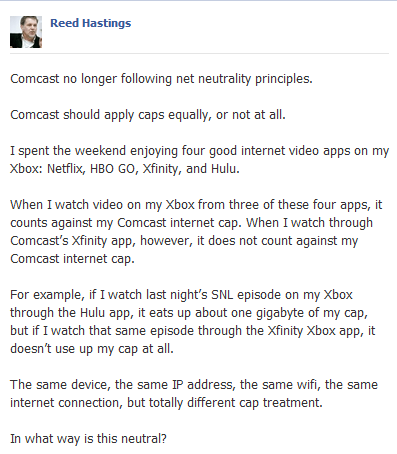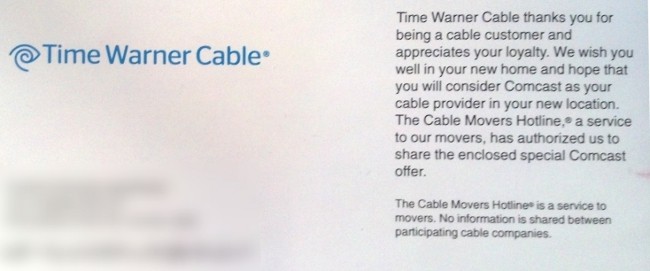As Stop the Cap! has warned Netflix for years, Internet Overcharging schemes like usage caps, usage-based billing, and speed throttles represent an end run around Net Neutrality. If a provider cannot openly discriminate against the competition, slapping usage limits on them (while exempting favored services from that cap) can eventually accomplish the same thing.
Netflix founder Reed Hastings is finally getting the message after a frustrating weekend watching his Comcast usage allowance bleed away while streaming video. He shared his views on his Facebook page:
Comcast [is] no longer following net neutrality principles.
Comcast should apply caps equally, or not at all.
I spent the weekend enjoying four good internet video apps on my Xbox: Netflix, HBO GO, Xfinity, and Hulu.
When I watch video on my Xbox from three of these four apps, it counts against my Comcast internet cap. When I watch through Comcast’s Xfinity app, however, it does not count against my Comcast internet cap.
For example, if I watch last night’s SNL episode on my Xbox through the Hulu app, it eats up about one gigabyte of my cap, but if I watch that same episode through the Xfinity Xbox app, it doesn’t use up my cap at all.
The same device, the same IP address, the same wifi, the same internet connection, but totally different cap treatment.
In what way is this neutral?
Comcast says it is “neutral” by framing its own Xbox-streamed video as a “set top box replacement,” even though the video that flows to the Xbox console travels down the same last-mile network Comcast says it needs to “protect” with its 250GB monthly usage cap.
Comcast doesn’t actually need a 250GB usage cap, particularly after the company upgraded its broadband facilities to DOCSIS 3 technology. That vast improvement in capacity at a comparatively low cost (easily recouped by the company’s latest round of rate increases) should be shared with customers. Instead of “applying caps equally,” Comcast should abandon them altogether.
[Thanks to Earl, one of our regular readers, for sharing the story.]


 Subscribe
Subscribe









